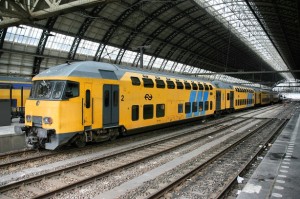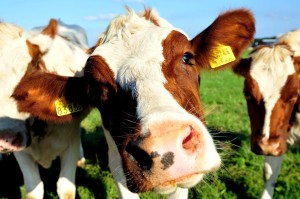Worldlog Semana 27 – 2014
Tuvimos dos logros importantes la semana pasada!
El primer logro fue que a partir de ahora nuestros parlamentarios tienen que viajar en tren si tienen citas de trabajo que no excedan los 750 kilómetros. Un buen paso hacia un mundo más sostenible.

Los diputados van regularmente en visitas de trabajo, también a otros países. El acuerdo era que las visitas internacionales hasta 500 kilómetros tenían que ser hechos por tren. Para por ejemplo, una visita a Berlín se tomaba siempre el avión (gubernamental). Esto sabiendo que los viajes en avión son muy contaminantes sabiendo que hay excelentes conexiones ferroviarias con los países vecinos y los países de su entorno.
En segundo lugar fue aceptada nuestra moción para detener hacer el uso del Royal Bank of Scotland. Ya la semana pasada hable acerca de esto en mi Worldlog. El Royal Bank of Scotland no hace su trabajo en forma honesta y por esto no saca buenos puntos en el test Holandés para Bancarios Honestos, donde se ha investigado sobre los derechos humanos, el bienestar animal y el medio ambiente.

Royal Bank of Scotland es el banco del gobierno Holandés desde 2008 y se encarga de los pagos de los parlamentarios y los ministerios. Con esto el banco gana 1,7 a 2,0 millones de dólares anuales. Por los escándalos alrededor de las bonificaciones y el asunto Libor el Royal Bank of Scotland salió en forma negativa en las noticias. Pueden leer más en mi Worldlog de la semana pasada.
La semana pasada también estuvo marcada por los transgénicos. Las normas europeas relativas a la autorización y realización de cultivos genéticamente modificados van a cambiar a corto plazo. La consecuencia será que los Estados miembros por escrito tendrán la opción para no permitir el cultivo de transgénicos en su territorio. Pero a cambio se les permitirá más cultivos de transgénicos en Europa. También existe el peligro que los Estados que prohíban el cultivo de OGM en su territorio podrán ser demandados por una empresa como Monsanto.

Nosotros luchamos por una Europa libre de transgénicos! Hasta que esto resulte, los estados miembros tendrán que tener la oportunidad para prohibir los cultivos transgenéticos en sus territorios. El acuerdo ahora firmado entre los ministros de medio ambiente de los estados miembros según nosotros es totalmente inadecuado para realizar una prohibición nacional.

También he luchado duro la semana pasada para la prohibición de los choques eléctricos y las ataduras permanentes de las vacas en la cría de ganado. La atadura permanente de las vacas y las descargas eléctricas para obligar al animal no hacer sus necesidades en la zona de descanso no en un país civilizado. El Secretario de Estado Dijksma ha prometido en el debate investigar cuantas empresas utilizan las descargas eléctricas.
En los establos antiguos sucede que las vacas están atadas permanentemente a una cuerda o cadena. El llamado ‘entrenador de vacas’ puede ser usado para mantener limpio el lugar de descanso de la vaca. Los entrenadores de vacas son cables de corriente eléctrica que son colgados sobre la espalda de la vaca. Con el engorde o para orinar las vacas reciben una descarga eléctrica, por lo que dan un paso atrás y lugar de descanso se mantiene limpio.
Ya en febrero de este año hice preguntas sobre las vacas atadas. Ellos no pueden caminar y tienen un espacio limitado. Esto puede causar problemas de salud y el bienestar de las vacas se ve seriamente comprometido. Así que hay que dejar esta práctica muy poco amigable para los animales.
Esta es una buena campaña para apoyar! Este grupo de acción recauda dinero para limpiar (es decir, dejar principalmente sin plástico) a los océanos. Después de 19 días de campaña, ya hay una cantidad de 750.000 dólares recolectada. Ayuden también para recuperar los océanos de los plásticos
Para todos aquellos que dicen que los grandes parques solares aún no son posibles, en Chile se demuestra lo contrario. Si es posible! Chile abre el parque solar más grande de América Latina 🙂
Saludos, Marianne
Two breakthroughs in the past week!
The first is that the Members of the Parliament will in future have to travel by train if they have work appointments that are no further than 750 kilometres away. This is a wonderful step towards a more sustainable world.

Members of the Lower House frequently make working visits, also to other countries. The agreement was that international working visits up to 500 kilometres away would have to be made by train. For instance, for visits to Berlin the (government) plane was thus standardly used. This is despite the fact that flying is environmentally contaminating and that there are good train connections with our neighbouring countries and the countries surrounding them.
Secondly, our motion was adopted to stop banking with Royal Bank of Scotland. I already spoke of this in last week’s Worldlog. Royal Bank of Scotland scores a poor grade in the test of the Dutch ‘Fair Bank Guide’, which investigates human rights, animal welfare and the environment.

Royal Bank of Scotland is the State’s principal banker and has been taking care of the payment traffic of the Lower House and of all ministries since 2008. With this, the bank earns 1.7 to 2.0 million euros on an annual basis. Because of scandals regarding bonuses and the Libor Affair, Royal Bank of Scotland received bad press. Read more about this in last week’s Worldlog.
Last week, the focus was also on genetic technology, as European regulations on the admission and cultivation of genetically manipulated crops will change in the short term. The consequence thereof will be that Member States are given the option to reject the cultivation of genetically modified crops within their territory. In return, however, more genetically modified crops will be permitted in Europe. Furthermore, there is a big chance that a company like Monsanto will bring charges to Member States which prohibit genetic cultivation within their territory.

We aim at a Europe without genetic technology! But until that is the case, Member States should have the option themselves to prohibit the cultivation of genetically modified crops within their territory. The agreement that was recently made between the Member States’ Ministers of the Environment is completely insufficient to effect such national prohibition as far as we are concerned.
The past week, I have also stood up for the banning of electric shocks and the permanent tying of cattle in cattle farms. The permanent tying of cattle and the use of electrical shocks to force the animal not to relieve itself in its resting area does not suit a civilised country. State Secretary Dijksma did promise in the debate that she would investigate how many companies use electrical shocks.

Cows are frequently permanently tied by a rope or chain in old stables. A so-called ‘cow trainer’ can be used to keep the resting area of the tied cow clean. Cow trainers are live wires that are hung above the back of the cow. When relieving themselves they will get an electric shock so that they take back a step and keep the resting area clean.
In February of this year, I already asked questions about the tying of cows. Cows that are chained cannot walk and have limited room to move. This can result in health problems and it seriously affects the welfare of the cows. They must stop these highly animal-unfriendly practices!
This is a great campaign to support! This action group collects money to clean up the oceans (make them free from plastics). After 19 days of campaigning, they have already collected an amount of 750,000 dollars. Please help to clean the oceans from plastic!
Chile has proved the contrary to all people who said that large solar power plants are not yet possible. It is possible! Chile is opening Latin America’s largest solar power plant. 🙂
Greetings, Marianne